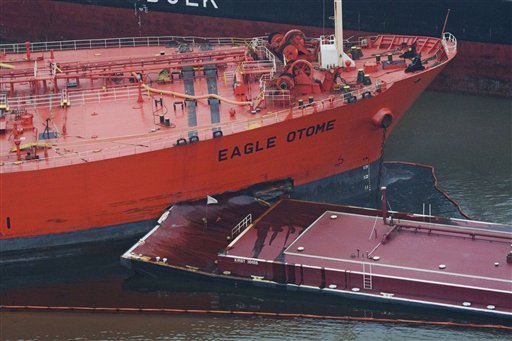
Incident Report Subject: Coast Guard - Oil Spill in Port Arthur Contained Date of Email report: Sun 24/01/2010 Report Detail:
The cause of collision was still under investigation. According to Petty Officer Richard Brahm, the ship's crew members said they pumped 69,000 barrels from the damaged tank that carried 80,000 barrels, so they have 11,000 barrels - about 450,000 gallons - that they could not account for. Several local officials said only 1,000 barrels, or about 42,000 gallons, of oil had been spilled into the water. Brahm acknowledged that it didn't look like hundreds of thousands of gallons of crude was in the water. He said some might still be in the damaged tank. Even if 450,000 gallons were released, the spill would still be much smaller than the 11 million gallons spilled in Prince William Sound when the Exxon Valdez ran aground in 1989. Coast Guard Capt. J.J. Plunkett said initial reports indicated none of the oil in the Texas spill had affected area marshes or hurt any local wildlife. He said officials believed the oil spill was "pretty much contained" in a 2-mile stretch of the Sabine Neches Waterway, where the spill took place and that runs along the city of Port Arthur, about 90 miles east of Houston. "That would make the cleanup shorter, not longer," Plunkett said. "The unknown of it is mother nature and what she's going to do with spreading around the oil." Plunkett said the cleanup effort was expected to last at least through Sunday. The two vessels were still blocking the waterway Saturday night, with a couple of Coast Guard ships floating near them. The smell of oil was at times strong in the air and throughout the waterway one could see the orange plastic floating barriers that had been put in place by the Coast Guard to contain the spill. Fewer than 100 people in a 28-block area of downtown were evacuated from the area following the collision because hydrogen sulfide - a hazardous gas with a rotten egg smell - was emanating from the oil, said Port Arthur Police Officer Wendy Billiot. But they were allowed to go home by Saturday evening after the gas was no longer being detected. Mike Free, a battalion chief with the Port Arthur fire department, said authorities would re-evaluate whether to order another evacuation when the two metal vessels are separated. Plunkett said officials were working a plan on how to separate the vessels to ensure there is no fire or explosion and that no additional oil is spilled. During the collision, the towing vessel also hit another tanker that was tied to a pier. Brahm said that tanker sustained some damage, but had no leaks. The damaged tanker, the Eagle Atome, is owned by AET Tankers, a Malaysian company with offices in Houston. AET said in a statement that it was working with authorities to determine how much crude had spilled. One of the worst shipping accidents in the area was the June 1990 spill from the Norwegian tanker Mega Borg. It leaked 4.3 million gallons of crude oil about 60 miles off Galveston. Additional Documentation:
|

